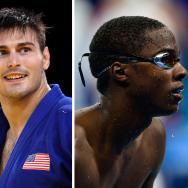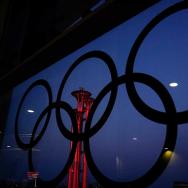University of Chicago Prof. John J. MacAloon has attended 16 Olympic Games. First as an engaged observer, and later with access to—and participation in—the behind-the-scenes work of the International Olympic Committee (IOC) and its local partners in the host cities.
Trained as an anthropologist, MacAloon, AM’74, PhD’80, was a pioneer of the multidisciplinary field of Olympic studies. His books include This Great Symbol: Pierre de Coubertin and the Origins of the Modern Olympic Games (University of Chicago Press, 1981) and his edited volume Bearing Light: Flame Relays and the Struggle for the Olympic Movement (Routledge, 2013).
This past May, MacAloon received a Norman Maclean Faculty Award honoring “extraordinary contributions to teaching and student life by emeritus or very senior faculty" for his 48 years of teaching in the Social Sciences College Core and in the Master of Arts Program in the Social Sciences (MAPSS), which he directed from 1990 to 2013.
In this edited Q&A, MacAloon discusses the intersection of sports and politics, the rituals of the Games and the evolution of Olympic studies ahead of the 2024 Summer Olympics in Paris, which begin July 26.
What makes the Olympics so valuable as an object of anthropological analysis?
If you think about it, the Olympic Games are a kind of—not a laboratory, because they’re so huge that you can’t control variables—but a theater of the encounter of cultures on a world scale, and of global forms imposed from without on a succession of host cultures. These are core anthropology issues. As the great anthropologist Ruth Benedict liked to say, our goal is to make the world safer for differences. And it turns out, that’s pretty much Olympic ideology.
What were the earliest origins of your scholarly interest in this event?
Of course, I’ve always been aware of the Olympics, but I was also a track and field athlete in college. In 1968 I joined in a series of civil rights and antiwar protests by athletes. This movement culminated in the famous gestures of Tommie Smith and John Carlos on the victory stand at the 1968 Games in Mexico City, and in the Olympic Project for Human Rights.
That was central to my experience, but it led to this interesting question. You could have 100,000 people in the streets for an antiwar or a civil rights demonstration, and the system seemed to just shrug. But if a bunch of jocks got politics, all hell broke loose. Of course, we’ve seen this again recently with the take a knee and #MeToo movements in sports. So what is it about American culture, where sports and politics have this very strange relationship with one another?
When did you start observing the Games firsthand?
In 1976, I did my first extended fieldwork with an entire Olympic Games in Montreal. Being a poor graduate student at that time, with no funding and no credentials, I spent most of my time outside the stadiums in the public plazas. And it was a big aha! moment to see this whole popular festival that U.S. television never covers. So, I came to ask, what’s the relationship between the games, the rituals, this popular festival, and then the T.V. spectacle?
Many people, for example, don’t really care about sport but wouldn’t miss the Olympic opening ceremonies for the world. The ritual is central. For an anthropologist of my generation, the fascination is with rituals, and there is no other sporting phenomenon in the world that has developed rituals as important as those of the Olympic Games.
Today there are two requirements to be understood as a nation among nations. One is to be a member of the United Nations. The other is to walk in the Olympic opening ceremony. Governments have no choice, really, but to do what they need to do to have an Olympic delegation.
What were some highlights of your backstage experience?
My Korean colleague and I went the entire journey with the Olympic flame through Korea in 1986 for the Asian Games, and then repeated the whole thing in 1988 for the Olympics. Day by day, through every town, every village, many of the hamlets. The entire population of Korea was watching because they were convinced that the world had come to see Korean culture. It was an overwhelming experience.
All along the way we had the local cultural experts and were able to document what resources were appropriated to empower local cultural variations, differences, arts and crafts institutions, and, indirectly, political movements. This was Korea undergoing the democratic transformation.
What were the most daunting challenges you faced in helping establish Olympics studies?
I took my Ph.D. in the Committee on Social Thought. No anthropology department was going to take a student who wanted to work on the Olympic Games in those days. Anthropologists went to smaller communities, stayed there 12 to 18 months, and wrote about those cultures. How are you going to be an anthropologist of something so large, that has multiple languages constituting it, that moves around, et cetera? That was the biggest barrier.
Today, most young anthropologists work on big transcultural projects. So people say, John, you won. Well, yes. But people have to appreciate how long it takes to get backstage.
How does it feel to see the field flourish?
Well, there are now over 50 university-related autonomous centers of Olympic studies. When I started—inconceivable. Both those that are highly critical of the official Olympic organizations, and those that are based in the official Olympic organizations, have a high degree of diversity, stretching across quite a number of disciplines. All of that is very positive.
The unhappiness that I feel is that maybe research is getting away from fundamental, big historical and cultural and political questions and becoming, like any maturing research field, far narrower in the questions that are being asked. Secondly, there’s always the danger of being co-opted, now that the Olympic system is a big sports industry with lots of money and new fields.
One of the test cases was Beijing in 2022, in which the central authorities decided to publicly ignore the fact that at least an ethnocide, probably a genocide, was going on in the country that was hosting the Olympic Games. But the IOC and other sports authorities said, “Well, that’s politics. We don’t get involved in that.” Excuse me. Genocide is politics?
So, we had this horrifying contradiction of having the Games proceed very nicely, thank you, President Xi—and utter silence about the human rights situation in the host country. The organizing committee even threatened athletes that they would be certainly punished if they said anything about Chinese policy. The IOC was silent. This was a shocking contradiction. Does the Olympic Movement even want to be real anymore if, in fact, the Olympic sports industry’s requirement of Games at any cost is going to dominate?
Is there a particular event you’re going to pay attention to in Paris this summer?
For me it’s always the rituals. I love sport, but it’s pretty much the same everywhere. The rituals are so interesting for their common protocol, but also because of the ability for local culture and artists to vary it in terms of their own values and conceptions. There is going to be an experiment that I’ll be keen to watch.
Instead of the usual procession of the nations into the opening ceremony within the main stadium, the delegations are going to come down the Seine on barges, one after the other for several miles, disembark near the Eiffel Tower, and reassemble for the final aspects of the protocol.
You right away can see, wow, this is spectacle, with all the extra views of Paris and the athletes likely having fun on these barges. But the challenge for ritual is, are you going to turn a procession into a parade of floats? Something that is quasi-sacred with respect to national anthems, national flags, and national symbols, including the athletes themselves? Will that have the same moral and emotional impact, even while it’s going to probably be prettier and more fun?
What was your experience working on Chicago’s bid for the 2016 Summer games?
When we started, I was the only person in Chicago who knew many IOC members. Generally, everyone agreed we had the best technical bid, and I managed to convince lots of the voters that, from a popular festival standpoint, we would have had an unbelievable Olympic Games.
In working on the bid, suddenly there were conversations between the North Side and the South Side, between the West Side and downtown, across racial lines in our own neighborhoods—what’s going to go on in Washington Park and on the Midway, and how can the University leverage our new initiatives in the arts for the Olympic Arts Festival?
Chicago 2016 generated the first signed community benefits agreement—specifying, for example, how much of the Olympic Village would become affordable housing. Maybe given our civic finances, more perilous than anyone knew at the time, it’s fortunate that that we lost, but I think the bid process itself was good for our city.
You made such an impression on so many alumni that you’re receiving this award. You also ran a degree program—all while attending 16 Olympics and producing field-defining research. How did you balance all of this?
Balance would not be the right word. Just by being a passionate person, I suppose. I’ve always been passionately curious about individual lives, including the lives of my students.
The main point for me was always to help them become more reflective about their lives and trajectories. I wanted them to really come into their own educations, to come to possess what I call an owned intellectual autobiography, not just a transcript. I took these courses, but how did I come to value this idea? What ideas made no sense to me that I rejected? And what does this have to do with where I come from, with who I am, with my educational capital, with my career? That’s education to me.
—A version of this story originally appeared on the UChicago Magazine website.

